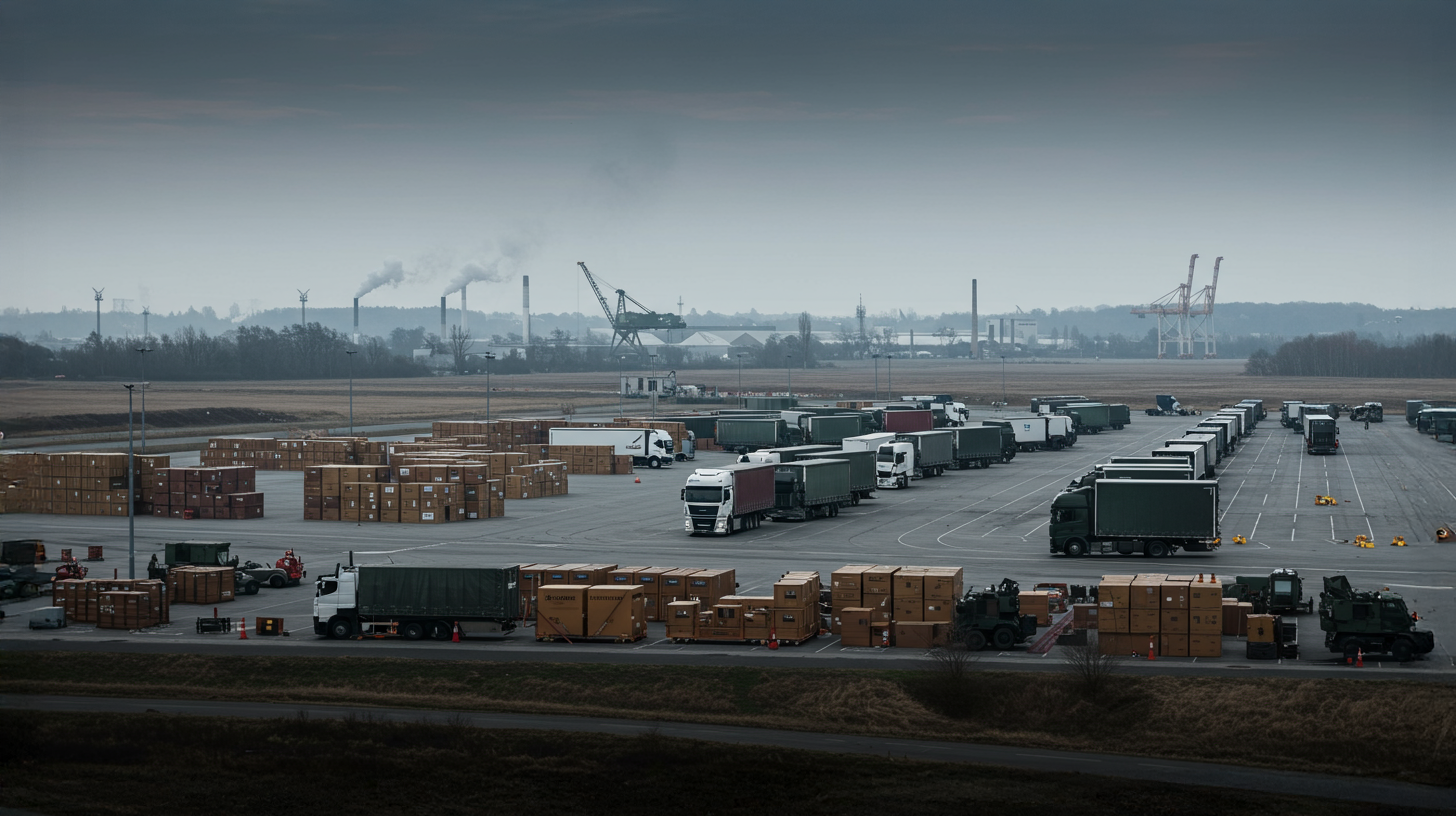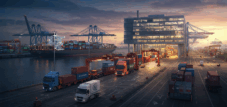
The Baden-Württemberg Freight Forwarding and Logistics Association (VSL) sets out requirements for logistics to ensure defense capability – Creative image: Xpert.Digital
Trade and security: The growing responsibility of the logistics industry in Germany
Why does the Spedition and Logistics Association give Baden-Württemberg (VSL) to a look at defense issues?
Why has a regional association of commercial logistics dedicated its annual general meeting of Germany's defense ability?
The VSL represents around 450 freight forwarding, transport and logistics companies with around 60,000 employees in Baden-Württemberg. These strongly export -oriented companies feel the effects of geopolitical conflicts, trade restrictions and increased security risks. Late chains are increasingly influenced by fragile, transit paths and global traffic flows from customs and sanction regimes. From this, the association concludes that economic resilience and military defense ability belong together: If Germany is poorly cared for in the event of seriousness or alliance, trade and prosperity are also under pressure.
What threats for peace, freedom and supply chains do the VSL name?
What specific risks does the association see?
The speeches at the general meeting outlined two levels of threat. First, wars and conflicts – especially Russian aggression against Ukraine – are endangering transport routes and energy and raw material flows. Second, tariffs, sanctions, and a global subsidy race are creating new barriers for exporters; small and medium-sized enterprises in particular are suffering from sudden rerouting and longer processing times. The association warns that a combination of both factors ultimately undermines free world trade and thus the foundation of the German industrial model.
As VSL President Dr. Micha does the demand to logistically support the Bundeswehr?
What is behind the guiding principle "our logistics companies can and must support the Bundeswehr"?
Dr. Lege draws a parallel to the NATO Double-Track Decision of the 1980s: Back then, the private sector supported political decisions to protect freedom and the market economy. Today, the industry must once again demonstrate responsibility and offer its expertise – warehousing, transport, IT management – as a strategic backbone. The President emphasizes that large-scale military transports, depots, and maintenance operations rarely operate without civilian commercial capacity in crisis situations. The Bundeswehr Logistics System (LogSysBw) already explicitly provides for the integration of third-party services into national supply processes.
What realignment calls CDU parliamentary group leader Manuel Hagel and how does the truck toll go?
What key statements did Hagel do in front of the association members?
Hagel asserts that the "old rules" – cheap gas from Russia, American security guarantees, inexpensive intermediate products from China – are obsolete. He calls for new free trade agreements and partners because global competition is not sleeping. Regarding logistics policy, he stated that under the CDU, there will be no tolls on state and municipal roads in the next legislative period and praised the "road finances road" principle, which strengthens the earmarking of federal toll revenues. His stance has a history: As early as 2022, he opposed a state-sponsored toll expansion because inflation and the energy crisis were burdening the industry. The VSL welcomes this position, as additional toll burdens would further weaken competitiveness.
What economic consequences from the turn of the times described ARD stock exchange chief Markus Gürne?
Why does a financial journalist evaluate the special fund positively?
Gürne reminds that Germany's business model is based on export flows and therefore depends on stable supply routes. Geopolitical tensions increase the risk of expensive interruptions. A strong European security architecture, financed by a targeted special fund, is therefore a commandment of business reason. He argues that investments in defense and modern infrastructure reduce future costs of avoidable disorders and at the same time create high-tech orders for industry.
How is the 100-billion special assets designed and where is it going?
What can the money be used for and what shares are logistic projects for?
The Basic Law and the Bundeswehr Financing and Special Assessment Act stipulate that the funds should close ability gaps and strengthen alliance and defense ability. Specifically, the spectrum of armor investments, ammunition, infrastructure, IT security, key technologies and logistics includes. The full 100 billion euros are contractually bound by the end of 2024; For 2025, the business plan provides for around 22 billion euros, including transports, depots and military IT networks.
Why does the VSL demand that special funds do not result in social expenditure?
Why emphasizes Dr. Do the purpose binding?
The association president points out that special funds represent debts. They are only legitimate if they increase productivity, security and growth. Floss funds in ongoing social transfers, the investment effect fizzles out; Then companies would have to bear a higher interest and tax revenue without receiving competitive framework conditions. The point of view coincides with financial policy debates in the Bundestag, where several factions strive for a strict purpose commitment for armaments and logistics investments.
Hub for security and defense - advice and information
The hub for security and defense offers well-founded advice and current information in order to effectively support companies and organizations in strengthening their role in European security and defense policy. In close connection to the SME Connect working group, he promotes small and medium -sized companies (SMEs) in particular that want to further expand their innovative strength and competitiveness in the field of defense. As a central point of contact, the hub creates a decisive bridge between SME and European defense strategy.
Suitable for:
How the Bundeswehr and private logistics will have to work together in the future
What does the required “economic turn” mean for logistics companies?
What structural changes does the association require?
Dr. Lege states that the logistics industry is already experiencing its most severe crisis in decades – weak industrial production, rising energy costs, and a shortage of skilled workers are simultaneously colliding with investment backlogs in ports, rail networks, and digital customs systems. An economic turnaround must accelerate approval procedures, ensure planning security for infrastructure projects, and create tax incentives for low-carbon propulsion technologies. Without these levers, the goal of achieving both climate neutrality and defense capability remains illusory.
How is military logistics in Germany structured today and where does it need a civil addition?
Is the Bundeswehr logistics enough for a large march?
The Bundeswehr's logistics command in Erfurt plans and controls all national and international logistics operations; Six mobile logistics battalions, depots, schools and a special pioneering battalion are assumed. Nevertheless, the Bundeswehr concept admits that organic capacities alone are not sufficient. Host Nation Support and framework contracts with freight forwarders should secure transport, envelope and warehouse with simultaneous NATO marches. The Bundeswehr sees Germany as a “logistical hub” on the NATO-East flank, which requires dense cooperations with private freight guides and terminal operators.
Which legal instruments regulate the integration of private logistics?
On what basis can freight forwarders be obliged or commissioned?
In peace times, federal authorities conclude transport framework contracts with logistics service providers; The Federal Office for Infrastructure, Environmental Protection and Services of the Bundeswehr is the billing position. In the event of a voltage or defense, the Transport Service Act and host nation support agreements that confiscate, regulate march loans, priorities and compensation also apply. The VSL warns to adapt these standards in a modern way so that there is legal and cost security if truck fleets or warehouses have to serve military purposes at short notice.
What role do customs policy, sanctions and trade dispute play in the current situation?
How do trade barriers affect operational logistics?
Every new tariff rate or list of sanctions creates additional documentation, control, and storage risks. Containers pile up because dual-use goods are subject to more stringent inspections; spare parts reach production lines late. Companies therefore need larger buffer stocks and more transport capacity, which is difficult to finance during a recession. At the same time, sanctions can unexpectedly shift logistics routes, for example, from land to sea or via third countries – with cost and time risks that also impact military deployment planning when civilian networks are to be used in parallel.
How do defense budget and special funds change the overall German household?
Do defense spending increase permanently?
The draft 2025 federal budget allocates €53.25 billion for core budget line 14; including special funds, defense spending totals just over €75 billion, exceeding the NATO two-percent mark for the first time in decades. Starting in 2028, once the special funds have been exhausted, significant additional budgetary resources would be required to maintain this level or raise it to three percent of GDP. Without budgetary consensus, funding gaps are therefore imminent – a risk that also slows private investments in defense and logistics.
What digital requirements do military and civilianogistics come up?
Why is digitization a core topic of the special fund?
Modern warfare requires networked position, real-time tracking and cyber resilient supply chains. Radio devices, satellite-based data links and cloud-based warehouse management make transport faster and are suitable for dual-use between military and civilian fleets. Speditions that want to remain interoperable in these networks must train your IT interfaces and to meet NATO standards for encryption or EDI formats.
How can the connection between climate goals, technology open to technology and national defense?
Do CO₂ reduction and military robustness exclude?
Hagel advocates for technological openness in climate-friendly drive systems. The logistics industry is testing biofuels such as HVO100 and e-fuels, which, according to association projects, can reduce emissions by up to 90 percent. At the same time, fuels must remain militarily storable and internationally available. Hybrid approaches – diesel-electric trucks with modular batteries – could operate green in peacetime and use conventional fuel in an emergency. It remains crucial that investments can be planned; constant regulatory changes slow down fleet conversions and jeopardize the achievement of targets.
What recommendations for action does the VSL formulate for politics and companies?
What specific steps does the association recommend after the general assembly?
First, the federal and state governments for infrastructure should limit a maximum of two years in order to quickly expand roads and rail freight corridors. Second, the VSL requires a crisis mechanism that prioritously prioritized military and civil logistics-needs transparently so that companies can adapt their capacity planning. Third, he calls for tax supervisures for alternative drives and digital safety technology. Fourthly, the Bundeswehr and the economy should realize joint exercises in order to test IT interfaces, customs processes and march routes.
What lessons do the logistics industry from the 2025 annual meeting draw?
What remains of the Esslingen meeting?
The event made it clear that supply chain security, military state defense and economic competitiveness cannot be treated separately. Speditors, reladers, politicians and media share the diagnosis that geopolitical tensions remain permanently and that a robust security architecture is essential. The Bundeswehr gives the Bundeswehr to the 100-billion special assets, but only in close interlinking with private logistics is there real through retain ability. At the same time, fiscal and regulatory policy must relieve the industry instead of burdening it with additional taxes. The VSL sees the core of an economic transition, freedom, infrastructure and climate protection together.
Your dual -use logistics expert
The global economy is currently experiencing a fundamental change, a broken epoch that shakes the cornerstones of global logistics. The era of hyper-globalization, which was characterized by the unshakable striving for maximum efficiency and the “just-in-time” principle, gives way to a new reality. This is characterized by profound structural breaks, geopolitical shifts and progressive economic political fragmentation. The planning of international markets and supply chains, which was once assumed as a matter of course, dissolves and is replaced by a phase of growing uncertainty.
Suitable for:
Advice - planning - implementation
I would be happy to serve as your personal advisor.
Head of Business Development
Chairman SME Connect Defense Working Group
Advice - planning - implementation
I would be happy to serve as your personal advisor.
contact me under Wolfenstein ∂ Xpert.digital
call me under +49 89 674 804 (Munich)

